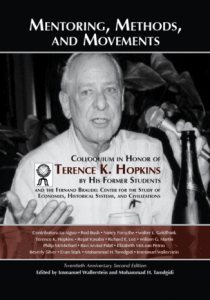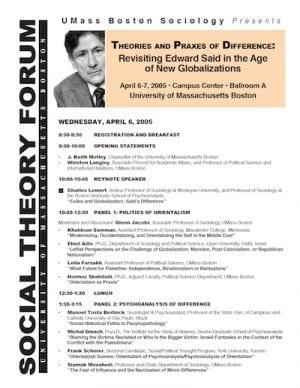Book Chapter — Opening Graduate Education: Expanding the Hopkins Paradigm — by William G. Martin
$15.00
Bill Martin significantly asks, for good reasons, “How did Terry do it?” Martin reviews the structural and conjunctural trends in contemporary academia and points to the contradictory dynamics of failed traditional academic models of teaching, research, and department building amid ever more “globalizing” trends in the world-system that continue to open new opportunities for the kind of alternative academic programs Hopkins initiated at Binghamton.
Description
Abstract
Bill Martin significantly asks, for good reasons, “How did Terry do it?” and in doing so reminds his readers of two things. One is the role of agency (in this case, that of Hopkins) in building new structures in academia and, second, that the other side of the Hopkinsian dialectic of relational thinking is also important for understanding how its large-scale/long-term and small-scale/short-term dimensions co-participate in perpetuating, challenging, or undermining the reality of the world-system. Martin reviews the structural and conjunctural trends in contemporary academia and points to the contradictory dynamics of failed traditional academic models of teaching, research, and department building amid ever more “globalizing” trends in the world-system that continue to open new opportunities for the kind of alternative academic programs Hopkins initiated at Binghamton.
Recommended Citation
Martin, William G. 2017. “Opening Graduate Education: Expanding the Hopkins Paradigm.” Pp. 9-24 in Mentoring, Methods, and Movements: Colloquium in Honor of Terence K. Hopkins by His Former Students and the Fernand Braudel Center for the Study of Economies, Historical Systems, and Civilizations. Edited by Immanuel Wallerstein and Mohammad H. Tamdgidi. Twentieth Anniversary Second Edition. Belmont, MA: Ahead Publishing House (imprint: Okcir Pres).
The various editions of Mentoring, Methods, and Movements: Colloquium in Honor of Terence K. Hopkins by His Former Students and the Fernand Braudel Center for the Study of Economies, Historical Systems, and Civilizations can be ordered from the Okcir Store and are also available for ordering from all major online bookstores worldwide (such as Amazon, Barnes&Noble, and others).
Read the Above Publication Online
To read the above publication online, you need to be logged in as an OKCIR Library member with a valid access. In that case just click on the large PDF icon below to access the publication. Make sure you refresh your browser page after logging in.





